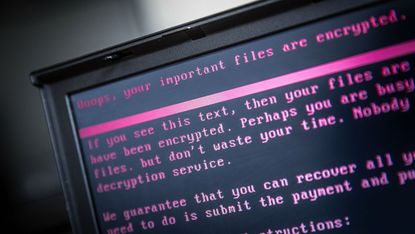What happens when a country comes under ransomware attack?
Irish healthcare system shuts down IT services after huge cybersecurity breach

Ireland has been hit by a “significant” ransomware attack forcing the country’s health services to shut their IT systems and cancel some medical appointments.
The IT systems could take “days” to return to their normal functioning in what has been described by a government minister as “possibly the most significant cybercrime attack on the Irish State” ever, reports The Irish Times.
Health service chief Paul Reid said there was a “human-operated” attempt to access data stored on central servers, possibly carried out by an international criminal organisation seeking to extort money. He told RTÉ that no ransom has been demanded at this stage, adding: “The key thing is to contain the issue. We are in the containment phase.”
Subscribe to The Week
Escape your echo chamber. Get the facts behind the news, plus analysis from multiple perspectives.

Sign up for The Week's Free Newsletters
From our morning news briefing to a weekly Good News Newsletter, get the best of The Week delivered directly to your inbox.
From our morning news briefing to a weekly Good News Newsletter, get the best of The Week delivered directly to your inbox.
On Thursday, there were “two or three” distributed denial of service (DDOS) attacks on parts of the HSE system which were thought to be “routine” at the time, reports the Irish Times. But it is now thought the attacks may have been “forerunners” for the bigger attack, and that those behind this were “knocking on the door”, the paper says.
What is ransomware?
Ransomware are computer viruses that take over other people’s devices, often with the threat to delete files unless a payment is made. Typically it gets into a device by exploiting vulnerable software or tricking a person into installing it. Security experts call ransomware the “fastest growing form of computer virus”, the BBC reports.
Could this happen in the UK?
Sign up for Today's Best Articles in your inbox
A free daily email with the biggest news stories of the day – and the best features from TheWeek.com
The UK has already suffered and experts warn it could easily happen again.
Foreign Secretary Dominic Raab this week made his first major speech on cybersecurity, outlining the creation of a new National Cyber Force, which would carry out “offensive operations” against criminal gangs, including denying gangs “access to their infrastructure and undermining their network”, reports the BBC.
Raab issued a warning to Russia, saying the country should take responsibility for cybercriminals operating in the country. “Even if it is not directly linked to the state they have a responsibility to prosecute those gangs and individuals,” he said.
In 2017, Britain was one of the more than 150 countries affected by the WannaCry ransomware attack. The virus encrypted data on infected computers and demanded a ransom of around £230.
At least 6,900 NHS appointments were cancelled because the systems closed down. A government report said the NHS had been particularly vulnerable because it had not followed cyber-security recommendations.
“NHS England said no patient data had been compromised or stolen and praised the staff response,” the BBC reported at the time.
Ciaran Martin, head of the UK’s National Cyber Security Centre, told The Guardian in 2018 that a major attack was imminent and that it was a matter of “when, not if”. He added that the UK was lucky to have avoided a category one attack – one “that might cripple infrastructure” – when it had already impacted other western nations.
How can I protect my data?
Some of the best defence methods are to have strong security measures, such as updating anti-virus software and passwords that are difficult to crack.
Create an account with the same email registered to your subscription to unlock access.
-
 The hunt for Planet Nine
The hunt for Planet NineUnder The Radar Researchers seeking the elusive Earth-like planet beyond Neptune are narrowing down their search
By Chas Newkey-Burden, The Week UK Published
-
 Magazine interactive crossword - April 26, 2024
Magazine interactive crossword - April 26, 2024Puzzles and Quizzes Issue - April 26, 2024
By The Week US Published
-
 Magazine solutions - April 26, 2024
Magazine solutions - April 26, 2024Puzzles and Quizzes Issue - April 26, 2024
By The Week US Published
-
 Data breaches increased in 2023 and with them, internet security concerns
Data breaches increased in 2023 and with them, internet security concernsThe Explainer One report found a 78% year-to-year increase in breaches from 2022 to 2023
By Justin Klawans, The Week US Published
-
 Cyberflashing, fake news and the new crimes in the Online Safety Act
Cyberflashing, fake news and the new crimes in the Online Safety ActThe Explainer UK's first conviction demonstrates scope of controversial law that critics describe as a threat to privacy and free speech
By Harriet Marsden, The Week UK Last updated
-
 Russian hackers allegedly breach US government agencies in cyberattack
Russian hackers allegedly breach US government agencies in cyberattackSpeed Read
By Theara Coleman Published
-
 Neurotechnology: how does new mind-reading technology work?
Neurotechnology: how does new mind-reading technology work?feature Developments in AI are turning thoughts into words but privacy fears are growing
By Rebekah Evans Published
-
 Clop gang: Russian hackers issue ‘dark web ultimatum’ to BBC, Boots and BA
Clop gang: Russian hackers issue ‘dark web ultimatum’ to BBC, Boots and BAUnder the Radar Affected companies urged to install security patches and not pay cyber criminals behind hack
By Rebekah Evans Published
-
 The UK’s new mobile emergency alert system: what is it and how does it work?
The UK’s new mobile emergency alert system: what is it and how does it work?feature Government will test new scheme this month with warning sound and vibration on nation’s phones
By Harriet Marsden Published
-
 Are killer robots now legal in San Francisco?
Are killer robots now legal in San Francisco?feature Officials vote to allow police to use remote-controlled devices with lethal capability in ‘extraordinary circumstances’
By Richard Windsor Published
-
 Catfishing: what the law says
Catfishing: what the law saysfeature Campaigners are calling for online deception to become a specific criminal offence
By The Week Staff Published